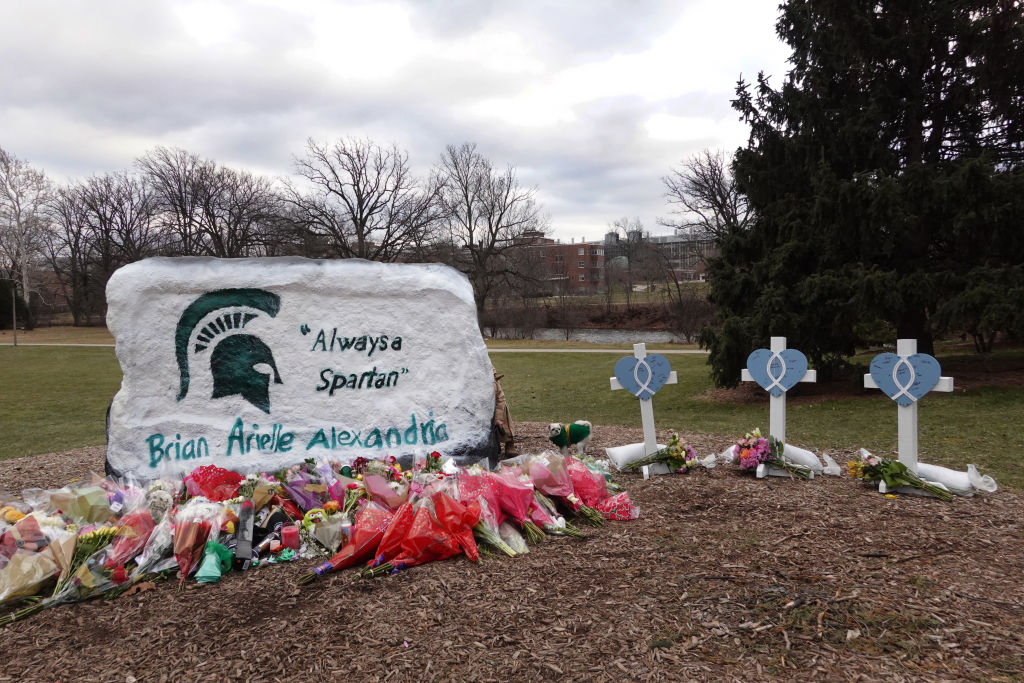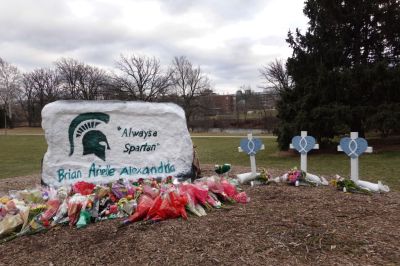There are two guilty parties in the Michigan State shooting: One is the shooter, who had a history of mental-health problems and criminal behavior involving firearms, and the other is former Ingham County Prosecutor Carol Siemon, a public official of the kind for whom a self-respecting society might consider dusting off the pillory.
It is too late to punish the killer, who took his own life shortly after murdering three college students and wounding five others. It is not too late to hold Siemon to account, even though she is retired. As a moral matter, rather than a legal one, she is a party to this crime and ought to be recognized as such.
Like the great majority of people who commit murders in the United States, the Michigan State shooter had a criminal history—one that would have prevented him from legally purchasing a firearm if not for the cowardice and incompetence of the prosecutors in Ingham County, Michigan, where Siemon served as chief prosecutor until her retirement late last year. She was the head of the office in 2019. That’s when the Michigan State shooter last came to the attention of authorities—when he was brought in on a felony charge of illegally carrying a handgun. As is all too common in these matters, a second, lesser charge was introduced, this one a misdemeanor. The future killer pleaded guilty to the misdemeanor, and Siemon’s office dropped the felony charge.
A convicted felon cannot legally purchase a handgun from a licensed dealer in Michigan or anywhere else in the United States. Someone convicted of a misdemeanor charge generally can. Apologists try to wave this away, claiming that the misdemeanor charge and the felony would have produced similar sentences. That may be, except for two big things: One, felons can’t legally buy guns; two, felons can and do acquire firearms illegally (far more often than they purchase them from licensed retailers, in fact), but felons who are locked up do not shoot up college campuses. We need to take people who commit gun crimes off the streets before their criminal careers escalate to include murder.
In addition to its straightforward felony gun-carrying charge, Michigan has a law on the books enabling prosecutors to charge those who commit or attempt to commit felonies while in possession of a firearm with a separate “felony-firearm” charge carrying a minimum two-year sentence. But prosecutors have to make the charge, and Siemon, as a matter of publicly stated policy, refused to do so, changing the rules in 2021 for the predictable reason—because of racial disparities, real and perceived, in law enforcement.
The decision to go easy on gun crimes is, to be clear, a political decision, the rationale for which was offered by defense lawyer Wade Fink in the Detroit News: “If everybody went to prison for that, you would have an overcrowding problem and you would be giving a lot of younger people felonies, which hurts them their whole life.” That might be a plausible argument if we were talking about an 18-year-old who got busted selling a little weed, but we are not talking about that: We are talking about people who carry guns illegally, which is a felony in Michigan, and who commit other felonies while carrying a firearm. We know from long experience that these are precisely the people who go on to commit more serious crimes.
“What would have stopped this is more difficulty accessing guns,” Fink said. A felony conviction would have made it more difficult to access guns—it would have made it impossible to do legally. And if prosecutors had really done their jobs in the felony gun-possession case rather than drop it, the future killer could very well have still been in prison—and three college students would still be alive.
The decision to knock that felony down to a misdemeanor is much more directly connected to the murders of those college students in Michigan than is anything else you’ll hear about in this matter: the NRA, “assault weapons,” etc.
Democrats—of course Carol Siemon is a Democrat—insist that we have a gun-policy problem, but they keep demonstrating that what we have is a problem with police, prosecutors, and other criminal-justice officials refusing to do the basics of their jobs. They will do anything except their jobs: We have law-enforcement officers forming literal gangs (as in the current Los Angeles County Sheriff’s Department or the old LAPD “Ramparts” squad of thugs, drug-dealers, and bank-robbers) or organized into groups that behave in effect as criminal gangs (as in the violent, apparently murderous, now-disbanded Memphis “SCORPION” unit, which shared its name with a half a dozen current and vintage criminal organizations from Chicago to Surrey), we have prosecutors who simply cannot wait to wave the bloody shirt and use every spectacular crime, however horrifying, as an occasion for rank electioneering, we have a splendidly funded network of penal institutions and surveillance organizations—but catch an actual criminal committing an actual crime involving an actual firearm and ... nothing, usually.
And I do mean usually. In many big U.S. cities, the most common outcome for a criminal charged with a crime involving a firearm is outright dismissal, a trend that has grown measurably worse since the George Floyd riots. In Philadelphia in 2016, 30 percent of gun-crime cases were dismissed—a high number, to be sure, but less than half of what it is today: 61 percent.
When Siemon changed the rules for charging armed felons, the likely outcome was obvious enough, and she was roundly criticized for it by more responsible people, including the county sheriff. Her successor reversed her policy on his first day in office.
These problems don’t come out of nowhere, and, by this point, they should not be any surprise.
Understood properly, the gun-control arguments put forward by Democrats such as Siemon have a two-fold purpose: One is to shift the blame to distant lawmakers in Washington and to culture-war enemies such as the National Rifle Association. The second goal is, in its way, more earnest: Democratic prosecutors and criminal-justice officials believe, with varying degrees of sincerity and stupidity, that they can be liberated from the unpopular and difficult parts of their jobs by stripping Americans at large of their civil rights under the Bill of Rights. They use federal policy to paper over the inability and/or unwillingness of local yokels in Ingham County, Michigan—and Chicago, and Baltimore, and St. Louis—to do their jobs.
The good people of Idaho live under the same Second Amendment as the people of Missouri, but the local homicide rate in Boise is 1/74th that of St. Louis. Gun policy does not seem to be a very important variable—the refusal of public officials such as Carol Siemon to do their jobs certainly is.
It is not as though the people living under this buffoonery do not have a choice: These miscreants are elected.






Please note that we at The Dispatch hold ourselves, our work, and our commenters to a higher standard than other places on the internet. We welcome comments that foster genuine debate or discussion—including comments critical of us or our work—but responses that include ad hominem attacks on fellow Dispatch members or are intended to stoke fear and anger may be moderated.
With your membership, you only have the ability to comment on The Morning Dispatch articles. Consider upgrading to join the conversation everywhere.